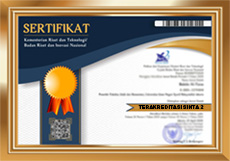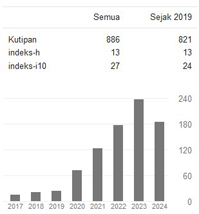Perjumpaan dengan Yang Lain: Refleksi Filosofis terhadap Film “Hotel Rwanda” dari perspektif Etika menurut Emmanuel Levinas
Abstract
This article presents a philosophical reflection on the story of Hotel Rwanda’s film from the Ethic’s perspective of Emmanuel Levinas. Hotel Rwanda’s Film tells a story about the conflict between two of Rwanda’s native tribes, Hutu and Tutsi, that highlighting violence and genocide as the impact of the racial discrimination paradigm. By analyzing some events that were pictures from the film, I saw that two interesting ideas to reflect by Levinas’ Ethic perspective. First, about the dangerous tendency of totality by stigmatizing other people by ideas. And the second is the philosophical idea regards to the meaning of encountering the face of the other, as the basis of responsibility to the other man. In that way, Hotel Rwanda’s film can be presenting a relevant illustration for some core on Levinas’ thought that focusing on the ethical problem concerning justice and humanity
Keywords: Hutu, Tutsi, Genocide, The Face, The other, Ethics.
Full Text:
PDFReferences
Film
Hotel Rwanda. 2005. Director: Terry George, Amerika Serikat: Lions Gate Film.
Pustaka
Anugrahbayu, Y. D. 2018. Yang Ada dan Yang Baik: Platonisme dalam Pemikiran Emmanuel Levinas. Jakarta: Tesis STF Driyarkara.
Bergo, Bettina. 2005. “Ontology, Transcendence, and Immanence In Emmanuel Levinas’ Philosophy”, dalam Research in Phenomenology, Vol 35.
Blum, Peter C. 2000. “Overcoming Relativism? Levinas’ Return to Platonism” dalam Journal of Religious Ethics 28.1: 91-117
Carman, Taylor. 2007. “Phenomenology as Rigorous Science”, dalam The Oxford Handbook of Continental Philosophy, ed. Brian Leiter dan Michael Rosen. Oxford: Oxford University Press.
_______________. 2015. “Levinas: Keadilan Lewat Perjumpaan” dalam BASIS. No. 05-06.
Doren, Kamilus Pati. 2020. “Perjumpaan dan Tanggung Jawab dalam Keberagaman Indonesia: Perspektif Emmanuel Levinas”, dalam Stulos: Jurnal Teologi, 18/2.
Hardiman, F. Budi. 2020. Humanisme dan Sesudahnya. Jakarta: Kepustakaan Populer Gramedia.
Jauhari, Ahmad. 2016. “Konsep Metafisika Emmanuel Levinas”, dalam Jurnal Yaqzan, Vol. 2, No. 1.
Klun, Branko. 2003. “Transcendence and Time: Levinas’ Criticism of Heidegger”, dalam Gregorianum, Vol. 88, No. 3.
Levinas, Emmanuel. 1969. Totality and Infinity: An Essay on Exteriority, trans. Alphonso Lingis. Pittsburg: Duquesne University Press.
_______________. 1990. “Reflection on the Philosophy of Hitlerism”, dalam Critical Inquiry. 17:1.
_______________. 1996a. “Peace and Proximity”, dalam Basic Philosophical Writings. ed. Ariaan T. peperzak, Simon Critchley, dan Robert Bernasconi. Bloomington and Indianapolis: Indiana University Press.
_______________. 1996b. “Is Ontology Fundamental?”, dalam Basic Philosophical Writings, ed. Ariaan T. peperzak, Simon Critchley, dan Robert Bernasconi. Bloomington and Indianapolis: Indiana University Press,
_______________. 1996c. “Subtitution”, dalam Basic Philosophical Writings, ed. Ariaan T. peperzak, Simon Critchley, dan Robert Bernasconi. Bloomington and Indianapolis: Indiana University Press.
_______________. 1998.Otherwise Than Being or Beyond Essence, trans. Alphonso Lingis. Pittsburg, Pennsylvania: Duquesne University Press.
Libertson, J. 1979. “Levinas and Husserl: Sensation and Intentionality”, dalam Tijdscrict voor Filosofie, September, 41ste Jaarg.
Mensch, James R. 2015. Levinas’s Existential Analytic: A Commentary on Totality and Infinity. Evanston, Illinois: Northwestern University Press.
Peperzak, Adriaan Theodoor. 1993. To the Other: An Introduction to the Philosophy of Emmanuel Levinas. Indiana: Purdue University Press.
_______________________. 1997. Platonic Transformations: With and After Hegel, Heidegger, and Levinas. Maryland: Rowman & Littlefield Publishers.
Prajna-Nugroho, Ito. 2017. “Edmund Husserl: Lembaran Baru Filsafat Kontemporer”, dalam Majalah Basis, No.05-06, Tahun ke-66.
Sastrapratedja, M. 2018. “Dari Humanisme ke Posthumanisme”, dalam Meluhurkan Kemanusiaan, ed. F. Wawan Setyadi. Jakarta: Penerbit Kompas.
Sobon, Kosmas. 2018. “Konsep Tanggung Jawab dalam Filsafat Emmanuel Levinas”, dalam Jurnal Filsafat, Vol. 28, No. 1.
Suseno, Franz Magnis. 2006. “Emmanuel Levinas: Panggilan Orang Lain”, dalam Etika Abad Dua Puluh: 12 Teks Kunci. Yogyakarta: Kanisius.
Tjaya, Thomas Hidya. 2018. Emmanuel Levinas: Enigma Wajah orang Lain. Jakarta: Kepustakaan Populer Gramedia.
_________________. 2011. “Konsep Hak dan Kewajiban di Asia”, dalam Hak-Hak Asasi Manusia: Polemik dengan Agama dan Kebudayaan. Yogyakarta: Kanisius.
DOI: http://dx.doi.org/10.31385/jl.v20i1.224.143-159
Refbacks
- There are currently no refbacks.

This work is licensed under a Creative Commons Attribution-NonCommercial-ShareAlike 4.0 International License.

Copyright© 2015 JURNAL LEDALERO This work is licensed under a Creative Commons Attribution-NonCommercial-ShareAlike 4.0 International License.
Institut Filsafat dan Teknologi Kreatif Ledalero Jalan Trans Maumere-Ende - Sikka - Flores - Nusa Tenggara Timur - Indonesia Telp/Fax: 0382 2426535










